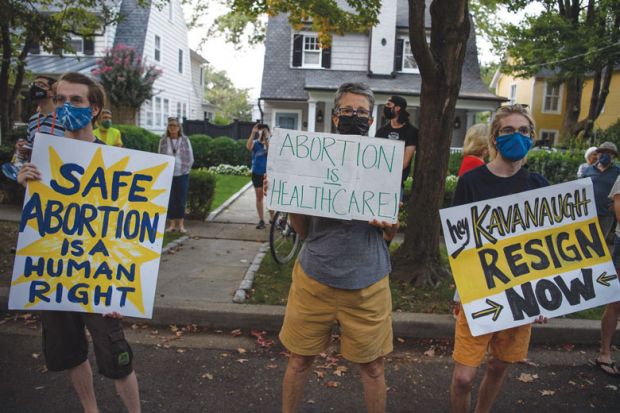Texas’ anti-abortion law looks likely to cost the state’s universities in enrolment and beyond, especially in medical schools where leaders are struggling to assess where and how they must revise curricula.
The law, which took effect this month, prohibits abortions as early as six weeks into pregnancy, with no exceptions for rape or incest.
It’s almost certain to affect medical training practices in Texas and the willingness of students and faculty to study and work in the state, though institutions are only beginning to assess the implications, experts said.
Obstetrics and gynaecology residency programmes across Texas remain “committed to teaching the full scope of women's healthcare”, said Eugene Toy, assistant dean for educational programmes in the department of obstetrics, gynaecology and reproductive sciences at the University of Texas Health Science Center at Houston.
But Professor Toy, who also serves as the Texas district chair at the American College of Obstetricians and Gynaecologists, said the state’s medical schools were still in the early days of figuring out how that will happen.
The broader effects on student enrolment at Texan universities were also seen as difficult to predict, but were expected to hit most heavily at the postgraduate level, where applicants have more flexibility in choosing locations where they feel safe living.
Texas institutions should also expect to lose quality faculty, warned William Sturkey, an associate professor of history at the University of North Carolina at Chapel Hill (UNC), where he had already seen that effect in the aftermath of problems that included the Nikole Hannah-Jones case.
UNC this summer lost Ms Hannah-Jones after the university’s trustees refused to grant her tenure in deference to wealthy conservatives opposed to her work creating The 1619 Project, an exploration of slavery’s central role in the rise of the US.
Shortly afterwards, Malinda Maynor Lowery, director of UNC’s Center for the Study of the American South, moved to Emory University. Another star academic, Lisa Jones, an associate professor of pharmaceutical sciences at the University of Maryland, Baltimore, backed away from coming to UNC, citing the treatment of Ms Hannah-Jones. Others have made similar decisions.
UNC had also received a taste of lawmaker-driven repercussions a few years earlier when the North Carolina legislature passed a law requiring people to use public toilets in accordance with the sex on their birth certificates.
“It’s something that UNC certainly is still struggling to recover from – this reputation as being a backward Southern state that is aggressively antagonistic toward the gay community,” Dr Sturkey said.
“That comes up sometimes when we’re recruiting students, absolutely, and when we’re recruiting faculty,” he said. “Although that’s been overshadowed by a number of different things at our institution since then.”
In the case of Texas, the rules on abortion are among several major actions this summer by the state legislature that could drive political discontent. Others include new laws restricting the ability of Texans to cast votes in elections, and letting people carry handguns in public without permits or training.
For many campus leaders, the politics can be sensitive, especially given the potential for retaliation. The governing board of North Idaho College last week fired its president in the culmination of a years-long bid by local conservatives to fight alleged liberal bias in higher education.
Meanwhile, students in other conservative-led states have expressed concern they may soon face their own versions of the Texas abortion law.
POSTSCRIPT:
Print headline: Abortion ban to hurt Texas’ universities
Register to continue
Why register?
- Registration is free and only takes a moment
- Once registered, you can read 3 articles a month
- Sign up for our newsletter
Subscribe
Or subscribe for unlimited access to:
- Unlimited access to news, views, insights & reviews
- Digital editions
- Digital access to THE’s university and college rankings analysis
Already registered or a current subscriber? Login








